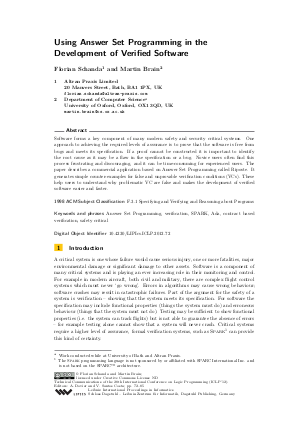Using Answer Set Programming in the Development of Verified Software
Authors Florian Schanda, Martin Brain
-
Part of:
Volume:
Technical Communications of the 28th International Conference on Logic Programming (ICLP'12) (ICLP 2012)
Part of: Series: Leibniz International Proceedings in Informatics (LIPIcs)
Part of: Conference: International Conference on Logic Programming (ICLP) - License:
 Creative Commons Attribution-NoDerivs 3.0 Unported license
Creative Commons Attribution-NoDerivs 3.0 Unported license
- Publication Date: 2012-09-05
File

PDF
LIPIcs.ICLP.2012.72.pdf
- Filesize: 0.83 MB
- 14 pages
Document Identifiers
Subject Classification
Keywords
- Answer Set Programming
- verification
- SPARK
- Ada
- contract based verification
- safety critical
Metrics
- Access Statistics
-
Total Accesses (updated on a weekly basis)
0PDF Downloads0Metadata Views
Abstract
Software forms a key component of many modern safety and security critical systems. One approach to achieving the required levels of assurance is to prove that the software is free from bugs and meets its specification. If a proof cannot be constructed it is important to identify the root cause as it may be a flaw in the specification or a bug. Novice users often find this process frustrating and discouraging, and it can be time-consuming for experienced users. The paper describes a commercial application based on Answer Set Programming called Riposte. It generates simple counter-examples for false and unprovable verification conditions (VCs). These help users to understand why problematic VC are false and makes the development of verified software easier and faster.
Cite As Get BibTex
Florian Schanda and Martin Brain. Using Answer Set Programming in the Development of Verified Software. In Technical Communications of the 28th International Conference on Logic Programming (ICLP'12). Leibniz International Proceedings in Informatics (LIPIcs), Volume 17, pp. 72-85, Schloss Dagstuhl – Leibniz-Zentrum für Informatik (2012)
https://doi.org/10.4230/LIPIcs.ICLP.2012.72
BibTex
@InProceedings{schanda_et_al:LIPIcs.ICLP.2012.72,
author = {Schanda, Florian and Brain, Martin},
title = {{Using Answer Set Programming in the Development of Verified Software}},
booktitle = {Technical Communications of the 28th International Conference on Logic Programming (ICLP'12)},
pages = {72--85},
series = {Leibniz International Proceedings in Informatics (LIPIcs)},
ISBN = {978-3-939897-43-9},
ISSN = {1868-8969},
year = {2012},
volume = {17},
editor = {Dovier, Agostino and Santos Costa, V{\'\i}tor},
publisher = {Schloss Dagstuhl -- Leibniz-Zentrum f{\"u}r Informatik},
address = {Dagstuhl, Germany},
URL = {https://drops.dagstuhl.de/entities/document/10.4230/LIPIcs.ICLP.2012.72},
URN = {urn:nbn:de:0030-drops-36114},
doi = {10.4230/LIPIcs.ICLP.2012.72},
annote = {Keywords: Answer Set Programming, verification, SPARK, Ada, contract based verification, safety critical}
}
